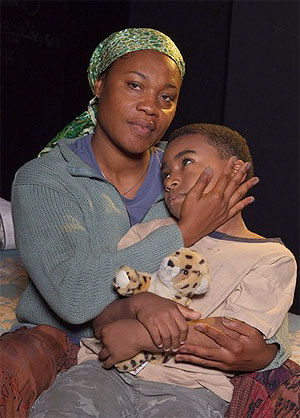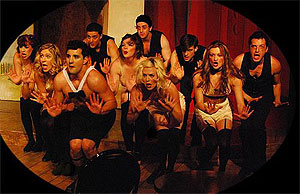Coming Home at Fountain Theatre
June 20, 2009 Leave a comment
 In 1995 audiences were introduced to Veronica Jonkers, a headstrong determined young woman from South Africa who leaves her humble farmland to pursue big city dreams of becoming a singer in Athol Fugard’s Valley Song. 14 years later we are reintroduced to her as she returns home for good with a child in tow. Fugard’s latest play is a sweet, quiet, and deeply affecting play that reflects the sentiments of the playwright about his homeland, South Africa, but told in a story about failed dreams, determination, and acceptance.
In 1995 audiences were introduced to Veronica Jonkers, a headstrong determined young woman from South Africa who leaves her humble farmland to pursue big city dreams of becoming a singer in Athol Fugard’s Valley Song. 14 years later we are reintroduced to her as she returns home for good with a child in tow. Fugard’s latest play is a sweet, quiet, and deeply affecting play that reflects the sentiments of the playwright about his homeland, South Africa, but told in a story about failed dreams, determination, and acceptance.
When the play’s protagonist Veronica Jonkers left for Cape Town to pursue a musical career, her action echoed the hope of a post-Apartheid South Africa. “As the years have passed,” said Fugard in an interview, “I have seen the dreams start to wither. It just seems to me, at this moment in South Africa’s history, I needed to follow up and take a look at that big dream that we had.”
And that dream is a sobering wake up call reflecting the hard truths of his homeland-a place, where even the most basic of healthcare is denied to the poor.
The play is set in 2002. Veronica (Deidrie Henry) returns to her now deceased grandfather Oupa’s (Adolphus Ward) humble shack of a home – wonderfully and realistically rendered by set designer Laura Fine Hawkes – that has been under the care of her childhood friend, Alfred (Thomas Silcott). There she hopes her five-year-old son, Mannatjie (Timothy Taylor) will warm up to the place and that she can pick up where she left off. But she carries a secret with her and a plan that involved her simpleton best friend who’s only aspiration in life is to own a red bicycle.
Jump forward four years later and the three are struggling to become a makeshift family at Veronica’s behest – though her now ten-year old Mannatjie (Matthew Elam) has much contempt for Alfred and may well have surpassed his intellectual level. Still, Veronica’s plan to secure her son’s future is the only thing that is keeping her going.
Fugard is keen on chronicling the state of his homeland in his plays. In Coming Home, the political issues brought to the fore are not imposed upon, but are clearly stated in the way they affect the daily lives of his characters. Veronica and Alfred remain stark contrasts to how dreams play out in a political context: Henry’s impressive singing attests to Veronica’s deeply rooted desire to make it on her own and the level of success she is capable of; while Alfred’s less lofty goals perhaps shielded him from the harsh realities of life. In any event, and in part by the careful and nuanced direction of Stephen Sachs, the play never becomes overwrought. It also maintains an ever-present theme of Veronica’s hope, especially with her son’s talent at writing, which acts as a symbol of her upbringing full of stories from his grandfather and her own need to keep her memory alive within her own son.

 Bitter Lemons
Bitter Lemons Picktainment
Picktainment EdgeLosAngeles
EdgeLosAngeles LA Stage Alliance
LA Stage Alliance Askew Theatre Company
Askew Theatre Company Hollywood Fringe Festival
Hollywood Fringe Festival LA Radar Festival
LA Radar Festival Goldstar
Goldstar Plays 411
Plays 411